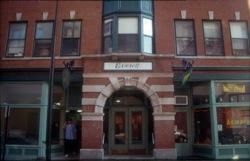
The Everett Chambers is a five-story lodging house in Portland Maine, designed in the Colonial Revival style by Portland architect Frederick Tompson in 1902. It was originally constructed at three stories and was raised to five stories in 1926. The ground level contains five store fronts, while the upper four floors contain single-occupancy lodging rooms, currently used by students from the Maine College of Art. A century after its construction, it continues to possess integrity of location, design, materials, workmanship, feeling, and association, and is significant both for its association with the development of downtown Portland as a major commercial, manufacturing, and tourism center in the late nineteenth- and early twentieth-centuries, and as a well-preserved example of an early twentieth-century lodging house. Everett Chambers was one of the earliest buildings in the city to be constructed specifically for use as a lodging house. The twentieth-century lodging house (or apartment hotel) differed from earlier types of residential accommodations, (such as boarding houses), and from hotels that catered to pleasure visitors, in that they were constructed specifically to accommodate transient and long term renters. Rooms contained sinks, common bathrooms were located on each floor, public spaces were kept to a minimum, and residents were expected to seek their meals at restaurants rather than take them at the lodging house. The building is also significant as an intact example of the work of prominent Portland architect Frederick A. Tompson, and shares several character-defining features with other Tompson commissions in the city.